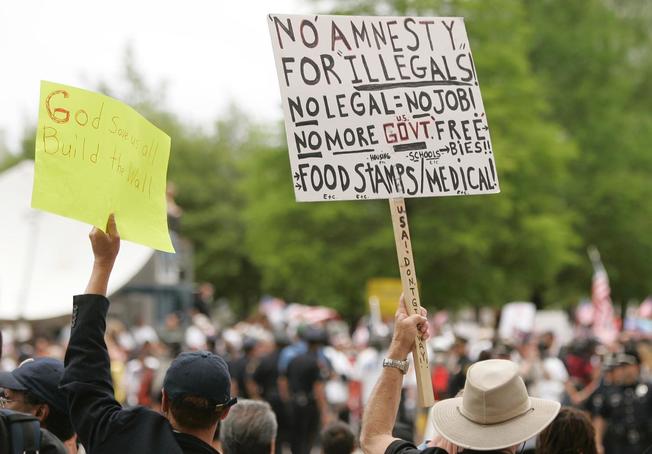
Chomsky, Trump, and Challenging Bigotry…
A few years ago, I was on the treadmill at the gym, trying to undo a day of sitting and staring at my computer, when a casual “gym friend” joined me on an adjacent treadmill. She noticed that I hadn’t been there much lately, and wanted to know why. I didn’t know her well and could have manufactured some quick story, but she had always been so warm and friendly, so I decided to tell her the truth: my 97-year-old father had passed away. Her response was immediate and kind, as she empathized with how hard it is to lose a parent. Then she looked up to the ceiling of the gym, and as I followed her gaze wondering what had stolen her attention, she said in a reassuring voice that “he is in heaven now,” and then looked back at me with a smile. Not knowing how to respond, I smiled back wanly and increased the incline on the treadmill. I wish I could believe my dad was in heaven and, as my partner says, I hope to be happily surprised…
She then asked about the funeral, and I explained that we had it right away because I’m Jewish and that’s what we do. Apparently distracted by the realization that I was a Jew, she paused, and then told me that she had many arguments with her Catholic friends who believe “the Jews killed Christ.” (Wait a minute – where did that lovely empathy go?!) Just as I was thinking about an exit strategy, she came back to earth and said, “It’s crazy that people of all faiths don’t get along.” And as I was mentally excusing her for that detour, she added, “except for the Muslims.” With those words, I was hooked again. I looked back at her and must have appeared surprised because she smiled uncomfortably…and then told me she worried that Muslims – presumably all Muslims – were terrorists. Wasn’t it time for me to leave the cardio area and work on my abs or something? But no, I couldn’t leave now because I saw this as a “teachable moment.”
Her comments really irked me. Here was a kind-hearted, well-meaning person who lacked real knowledge about Muslims, and seemed to be swallowing whole the Fox News/right wing extremist narrative. It upset me that people like her – presumably good people – can be so vulnerable to wrong thinking. Moreover, the current array of bigoted GOP candidates – fueled by and reinforced by right-wing media outlets – are able to reinforce people’s fears into a frightening political direction.

In his analysis of why Donald Trump is gaining traction in this presidential race, scholar and activist Noam Chomsky says that Trump is “evidently appealing to deep feelings of anger, fear, frustration, hopelessness, probably among sectors like those that are seeing an increase in mortality, something unheard of apart from war and catastrophe.” Trump supporters, he argues, “are sinking into hopelessness, despair and anger”. Instead of directing these feelings against the structures and institutions that are “the agents of the dissolution of their lives and worlds”, Trump incites people to blame “those who are even more harshly victimized,” including Muslims. Add to this the fact that Trump is an entertainer! He cushions his message of hatred of “the other” with the bombast of a reality TV delivery. Chomsky warns us that these “signs are familiar,” as they “evoke some memories of the rise of European fascism.”
I hearken back to the consistent message I heard throughout my life from my political activist father – that we must stand up for our beliefs. In the 1940s and 1950s, he was a very effective union organizer, fighting for better wages and working conditions for working men and women. But in 1954, he was called before the House Un-American Activities Committee (HUAC) to answer the now-infamous question, “Are you now or have you ever been a member of the Communist Party (CP) of the United States?” After much emotional wrangling, he decided to challenge the committee’s legality. As a result, he was “blacklisted” from employment in the U.S. and could only find work selling life insurance for 15 years through a Canadian firm. Again in 1965, he was subpoenaed to testify before the Committee. By that time, he had become a prolific playwright, writing about his experiences within the labor movement in an attempt to give voice to working people. His life choices affected his family. We lost friends and were rejected by family members. And yet I have internalized – without a doubt – the importance of challenging injustices.
So what did I say to my treadmill partner when she brought up her fear of radicalized Muslims? I told her that the media would like us to believe that all Muslims are terrorists, but most Muslims are peaceful people. Didn’t the “Koran incite Muslims to commit terrorist acts?” she asked. I replied that I knew that was completely false, drawing upon knowledge I have gained over the years.
Did I say enough to challenge her thinking? I’m not sure. There is that moment when we may ask ourselves, “Am I going to challenge this person? How do I do it respectfully? Am I risking their wrath? Will I feel uncomfortable? While it might be a conversation with just one person, I have no doubt that these interactions can make a difference in changing people’s minds. Maybe they will be more thoughtful or less reactive. But I believe that if we remain silent, we are – in a way – complicit.
There are many ways to fight misinformation and to work for a better, more equitable world. We can organize, write, teach, and, sometimes, just talk with a friend, colleague, or acquaintance. And we shouldn’t be afraid to do so.
FacebookTwitterGoogle+
